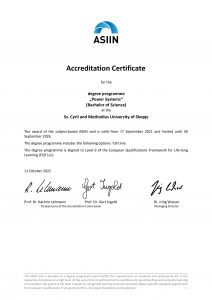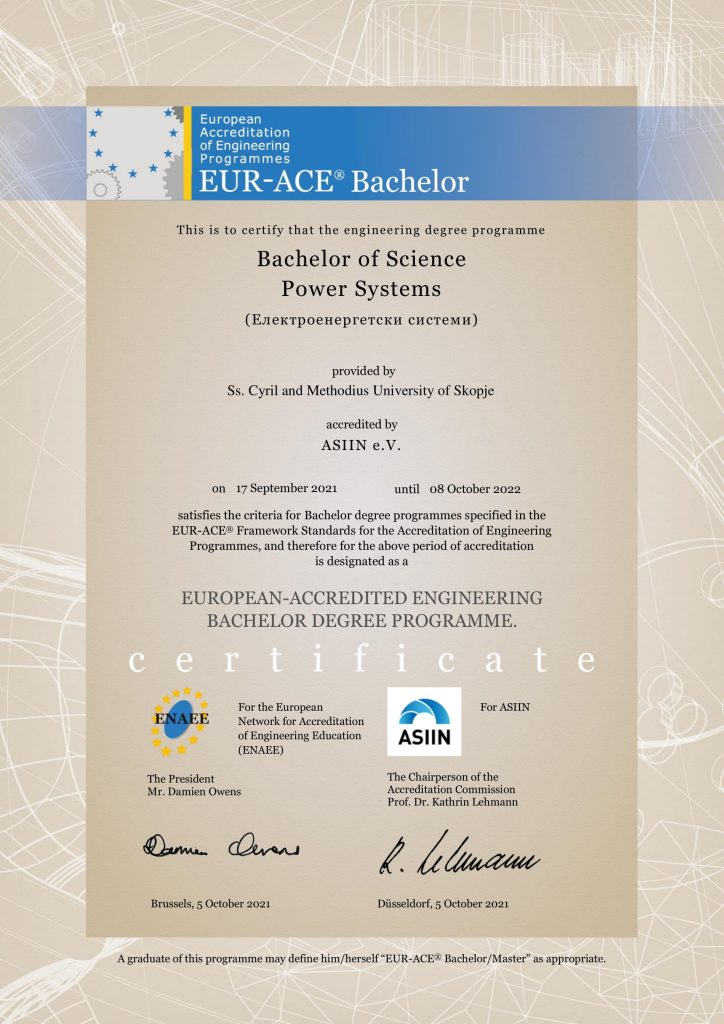ObjectivesLearning outcomesIIIIIIIVVVIVIIVIIIElective Courses
Study Programme
Power Systems
Degree Programme
First cycle degree programme
Level of qualification
Bachelor of Science in Electrical Engineering and Information Technologies, in Power Systems
Occupational Profiles of Graduates
Graduates from this programme will have unique opportunity to become a part of the Power Industry, which is one of the most stabile industries and continuously employs a number of young engineers for many decades now. The field of Power Systems offers chances for successful career and well payed job in transmission and distribution companies, electricity trading and supply, as well as, in the public sector, consultancy, installation design and equipment production companies. Following the implementation of the emerging technologies and market practices in the Power Systems, adequate specialists are urgently required in the country and worldwide, where our diploma is recognized without limitations.
The Programme Learning Outcomes
The study programme in Power Systems enables students to acquire know-how and skills in three out of four main activities of Power Industry: electricity transmission, distribution and supply. The teaching process includes use of state-of-the-art software tools for simulation and analyses of Power Systems operation, as well as, for in-deep study of Power Systems planning and control, Electricity Markets, High Voltage Engineering, Low Voltage Installations, Lighting and Quality of Supply. Quite a few Lab exercises in Faculty’s Laboratories provide additional opportunities for students to gain pratical knowledge in the area of power engineering. The theoretical and practical knowledge acquired during this programme qualify its students for resolving a spectrum of technical problems they may encounter in their careers.
International Accreditation
The first cycle study programs at FEEIT are accredited by the German Accreditation Agency for Study Programmes in Engineering, Informatics, Natural Sciences and Mathematics (ASIIN), which is a world leader in quality assurance in higher education. This accreditation confirms that the study programs satisfies the criteria for Bachelor degree programs specified in EUR-ACE Framework standards for the accreditation of engineering programs and the content studied are relevant to areas covered in study programs.


General Learning Outcomes
| Knowledge and understanding |
- Demonstrate knowledge and understanding in the scientific field of electrical engineering, based on education and training, including knowledge of theoretical, practical, conceptual, comparative, and critical perspectives in the scientific field according to the appropriate methodology.
|
| Application of knowledge and understanding |
- Demonstrate the ability to apply acquired knowledge and understanding in a professional manner.
- An ability to identify, analyze and solve complex engineering problems by selecting an appropriate method.
|
| Ability to assess |
- An ability to collect, analyze, evaluate and present information, ideas, and concepts based on relevant data.
- Making an appropriate assessment taking into account personal, social, scientific and ethical aspects.
|
| Communication skills |
- An ability to communicate effectively in both verbal and written forms with professional and non-professional audiences.
- An ability to work effectively as an individual or as a member of a team taking shared responsibility for collective results.
- Ability to participate independently, in a professional manner, in regards to scientific and interdisciplinary discussions.
|
| Learning skills |
- Commitment to the professional development and lifelong learning achieved through higher education, technical training, membership in professional societies, and other activities in order to update already acquired knowledge in the relevant field to achieve continuous professional growth.
- An ability to acquire and apply new knowledge as needed using appropriate learning strategies.
|
Specific Learning Outcomes
| Knowledge and understanding |
- Demonstrate knowledge and understanding in the scientific field of electrical engineering, based on education and training, including knowledge of theoretical, practical, conceptual, comparative, and critical perspectives in the scientific field according to the appropriate methodology.
- Demonstrate knowledge and understanding of research, development and engineering design in industrial processes and power systems.
- Understanding and knowledge of current issues related to scientific research and new sources of knowledge.
|
| Application of knowledge and understanding |
- An ability to identify, analyze and solve complex engineering problems.
- An ability to apply knowledge and understanding in a way that demonstrates professionalism to the relevant field or profession.
- An ability to identify, analyze and solve problems related to power systems.
|
| Ability to assess |
- An ability to collect, analyze, evaluate and present information, ideas, and concepts from relevant data.
- Making an appropriate assessment taking into account personal, social, scientific and ethical aspects.
- An ability to provide answers to both theoretical and practical issues, in order to give explanations and choose the appropriate solution.
- An ability to analyze, evaluate and present information, ideas, and concepts based on relevant data in the field of power systems.
|
| Communication skills |
- An ability to communicate effectively in both verbal and written forms with professional and non-professional audiences.
- An ability to work effectively as an individual or as a member of a team taking shared responsibility for collective results.
- An ability to participate independently and professionally in specific, scientific and interdisciplinary discussions.
|
| Learning skills |
- Commitment to professional development and lifelong learning through higher education, technical training, membership in professional societies, and other activities in order to update already acquired knowledge in the field and to achieve continuous professional growth.
- An ability to acquire and apply new knowledge as needed using appropriate learning strategies.
- Demonstrate a high degree of independence initiative for learning and professional development.
- Understanding the need for learning and ability for continuous professional development, through the use of professional and scientific literature, professional training, continuing formal education, membership in professional organizations, etc.
- Awareness of new technologies and an ability to evaluate and use modern software tools.
- An ability to use information technologies for distance and e-learning.
- Skills for cooperative, competitive and individual learning.
- Applying active teaching and learning techniques.
|
| During studying, the student may choose up to 4 courses from the faculty list of electives |
| During studying, the student may choose up to 4 courses from the faculty list of electives |
| During studying, the student may choose up to 4 courses from the faculty list of electives |
| During studying, the student may choose up to 4 courses from the faculty list of electives |
| During studying, the student may choose up to 4 courses from the faculty list of electives |
| During studying, the student may choose up to 4 courses from the faculty list of electives |





